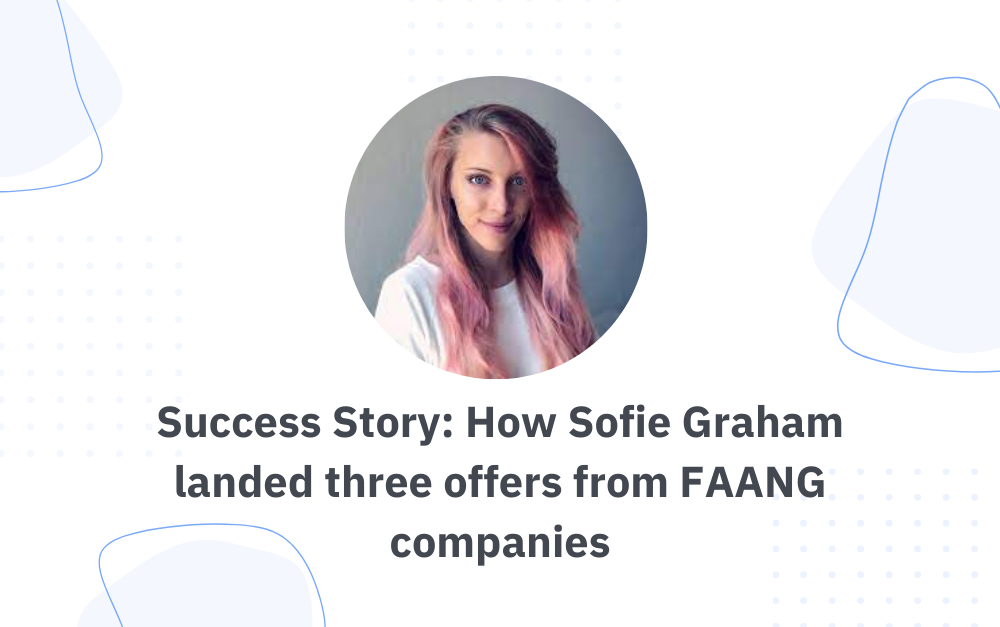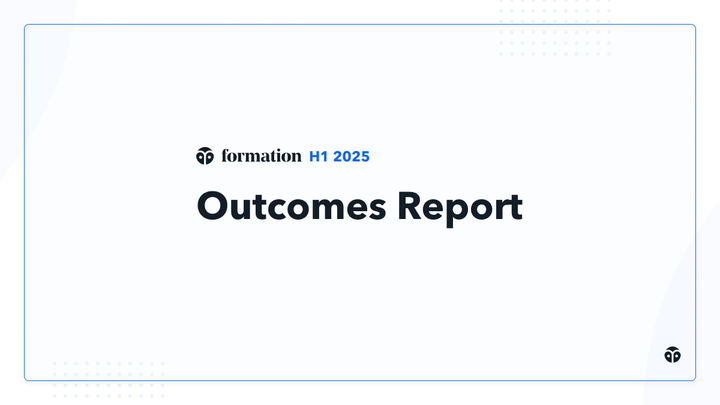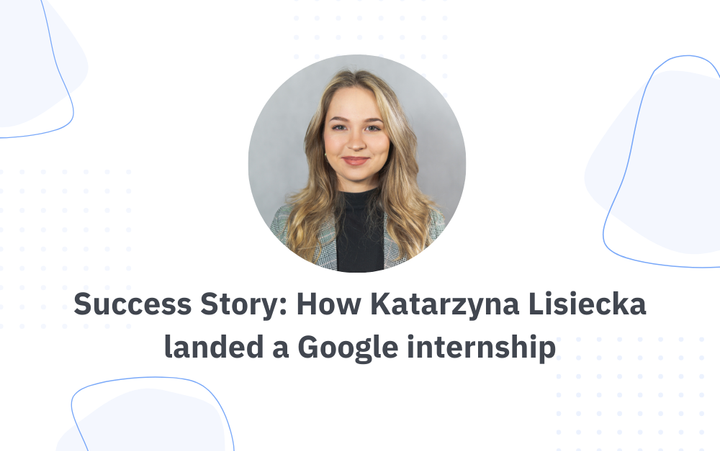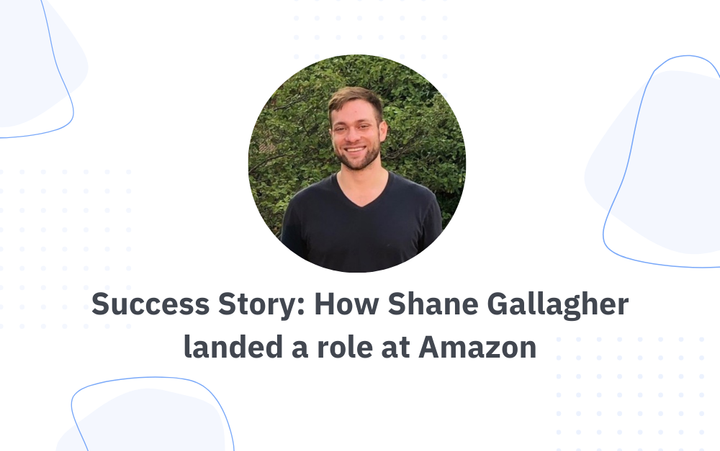Fellow Spotlight: How Sofie Graham landed three offers from FAANG companies
Learn how Sofie leveraged Formation's Fellowship to prep for FAANG interviews.

Welcome to Formation’s Fellow Spotlight, a blog series introducing you to former Formation Fellows who landed their dream jobs. Today, we’ll meet Sofie Graham, now a Software Engineer at Meta Reality Labs.
Can you introduce yourself? Tell us about your background before joining Formation.
Sure! My name is Sofie Graham. I recently relocated to Seattle from Boulder Colorado to start my new Software Engineering position at Meta, which I got with many thanks to Formation. I love climbing, spending time with my dogs, and curling up with a good video game on a rainy day, so Seattle is perfect for that.
How did you get started in software engineering?
I didn’t go to university for software engineering, so I discovered coding a bit later in life. While working as a video game designer in the UK and then as a marketer in San Francisco, I often found that we lacked the technical resources needed for the projects I wanted to do. So, I started teaching myself how to code in my free time and discovered that I really enjoyed it. After going through an intense coding bootcamp I rejoined the company as a software engineer.
What was your career progression like after the bootcamp?
After working as a full-stack product engineer for a couple of years I became interested in how large tech companies worked and I applied for a role at Amazon. My resume was rejected almost immediately, so I figured I should stick to startups. I transitioned to a backend role at Virtual Gaming Worlds where my core responsibility was building foundational microservices and scaling our backend as the company went through a huge growth phase. We had a team of talented engineers located all over the world and I learned a lot from them and eventually became a team lead myself, but I was still curious about big-tech so I chose to make the leap.
That’s when I decided to join Formation, which turned out to be the missing piece of the puzzle for me.
What made Formation stand out among all the choices you had?
I researched a few other options, but what really stood out to me about Formation was the type of people who work there. I spoke to a couple of folks and saw the way they talked about the program, their fellows, and their mentors. It gave me a sense of reassurance that these people genuinely cared about others' futures. Also, the fact that they provide you unlimited support until you land a role was also a deciding factor for me. I was so busy with my day job that I had no idea how much time I'd be able to commit to it, so I was relieved to find something I could do at my own pace.
Did you have specific goals when you joined the program?
Yes, a bunch of goals! For a start, I knew I needed to get really good at solving algorithm problems quickly for interviews. I had attempted the "LeetCode grind" a few times in the past, but never got to the level I needed to be confident. I also wanted structure and guidance on what I needed to focus on—the algo stuff is obvious, but there's so much more to technical interviews than that and I needed someone to help me see my blind spots.
The system design flow at Formation was incredibly helpful. Getting the background and practice I needed for those interviews was crucial, especially for the FAANG loops. Having people who have worked, or are currently working, at the companies that I was interested in actually tell me whether I would have passed or failed their interview was something that I never even realized was possible but was incredibly insightful.
What was your major takeaway from your time at Formation?
One major takeaway is the importance of having people in your corner who have been on the other side of the interview table hundreds of times. This is invaluable and something you won't get by studying alone. The continuous support from the same group of people throughout the program was something unique to Formation and it kept me on track at all times.
There are other options out there that will give you an interview if you pay for it, or they'll give you the curriculum if you pay for it, but having people know exactly how you're progressing toward landing a specific role at a specific company is something that I didn't even think existed and was incredibly grateful to find in Formation.
How did Formation impact your technical skills?
Technically, I went from being a zero to hero in terms of my ability to perform in coding rounds. I could solve problems much faster than I ever have in the past, which was necessary given the number of interviews I had, which were gated by timed coding rounds.
From the system design perspective, I learned how to talk about a system from front to back in a way that communicated my ideas very clearly to an interviewer. Prior to Formation, I felt like I had all the parts of the system in my mind, but speaking confidently about them and tying them together to form a cohesive technical solution to a problem within minutes was not something I had much experience with.
How did your interview process go?
I went into Formation thinking I would love to at least have the confidence to apply for these big tech companies. I walked out with three offers from FAANG companies. It’s a testament to the work that Formation did and the work that I did with them. You get out of it as much as you put in.
What advice would you give to someone considering joining the fellowship?
If any part of my story resonates with you, just go for it. I think a lot of very talented engineers don't pursue their dream roles because, ironically, they are too busy doing their actual work as engineers and being "interview ready" is very different from the skills you need day to day as an engineer. It’s hard to understand the value Formation provides without experiencing it firsthand. They help you in ways that you might not even anticipate and they give you the first week free so there's no downside to trying it.
If you're considering joining, ask Formation to put you in touch with people who have completed the program. Hearing from others who have gone through it can provide an unbiased perspective and help you decide if it’s the right fit for you.
Do you have any advice for people going through the interview process?
Whether you do Formation or not, do mock interviews. If possible, do them with experienced people like those at Formation. If that’s not feasible, do them with friends or others who are also interviewing. Talking out loud and getting feedback is something you can't achieve by studying alone.
How can Fellows get the most out of the fellowship?
Engage as much as you can with your Formation team. If you’re struggling with something or need more practice, ask them. They are very responsive and can adjust the curriculum to fit your needs. Always seek feedback to ensure you're on the right track.
Also, give them feedback, too! Multiple times during my program, the team added new modules or adjusted the program to better meet the needs of the Fellows, so be honest about what is working and what is not working because they will actually use that feedback.
Get holistic interview prep and negotiation support with Formation
The Formation Fellowship gives mid-level and senior engineering job seekers everything they need to land their dream roles—including personalized skill brush-ups, unlimited mock interviews with experienced software engineers and hiring managers from top-tier tech companies, and offer reviews and negotiation support.
Apply here for unconditional support from a team of engineering mentors, technical recruiters, career coaches, and more.



